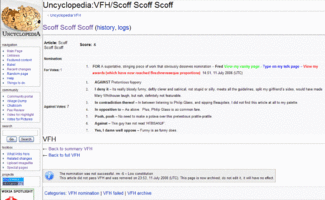Scoff Scoff Scoff
Scoff Scoff Scoff is a famous, short poem by Saul Williams concerning the gustatory side of life in the Caribbean. The poem notably received widespread critical condemnation from a range of sources as wide as Uncyclopedia's Poetry department (SHAME!) to the Norton Anthology of literature, who typically omit most of Williams's poetry by default. However, Scoff is now widely recognised as a masterpiece, having received a musical setting from Philip Glass; apt given the poem's inherent musicality.
The poem received its premiere at an open-mic battle in 2007. Unfortunately for Williams, Chuck D of Public Enemy was also there, and he beat the poet in a poetry contest, despite the fact that D's poetry was improvised on the spot. Williams came second place, finishing ahead of Snoop Dogg, who was too stoned to take part and freestyle, and a second-rate comedian, whose surreal rants were mistaken for bad poetry.
Synopsis and structure[edit]
The poem avoids traditional meters, preferring a monosyllabic approach, though it does abide by a traditional rhyming scheme. This is interpreted as, well! We're jumping the gun aren't we? We'll leave that to the interpretation section. Here is the full poem, printed in full, as it is but a short poem.
- Scoff scoff scoff scoff,
- Those are the sounds of my mouth,
- Scoff scoff scoff scoff,
- When I am eating way down South.
- When you are way down in deep Surinam
- I would avoid the smoked ham
- I instead prefer the Surinam scallops
- Full stop.
Suspicious of opening his poem with a grand statement of literary prowess, Williams situates the poem, within his mouth and the sounds it makes. He gives us in the first stanza (you know what a stanza is, of course...) an anthropological|[1] account of his eating habits, showing that they are not as important as his literary endeavours. Maya Angelou, on reading this poem observed: 'Saul be telling a fib with those onomatopoeias. I remember when I was at a literary prize evening; he forgets to mention that the food often falls out of his mouth as much as it goes in, so he's scoffing thin air half of the time'. Jesse Jackson wrote: 'I've dined with my man Saul on several occasions, and he doesn't usually take that long to chew through his food - I've seen him wolf many a steak down'.
Surinam poet Dennis van Tongo commented on the factual accuracy of the poem, something Wikipedians never spot: 'Yes, the scallops in Surinam are worth avoiding. I recommend the shrimp. Failing that, the bauxite', though Tongo was also irritated by Williams negative attitude: 'Why could he not praise our fish? What a shrimp!' Williams finished the poem in 2003 and put it aside until five years later - it was eventually published in a recent anthology in 2008, though it met with considerable opposition: of this Williams had to say: 'I like facing adversity - it brings out the self-aggrandiser in you, and that is something I am exceptionally, unopposedly stupendous at'.
Interpretations[edit]
“You would be surprised by how vicious the poetry world is now: Only last week did I shoot someone for writing in iambic tetrameter”
How do you interpret a poem like this? One interpretation would be to not read the poem and simply guess at what it means from the title alone. This is what most literature majors do anyway, so this is a tried-and-tested method. However, assuming you read like most people - top to bottom, and left to right, you will have (perhaps unfortunately) already read the poem before reaching this section. So this interpretative matrix (as it is known in fashionable literary studies) is forever shut off from you.[2]
Context[edit]
Williams admitted to being slightly drunk when he wrote this poem; this has an important effect on our interpretation of the poem, for we could not forgive Williams if this was the work of a sober mind. Seen in this light, it is not so much a poem, as a drunken jot, a sort of Renaissance potboiler to Shakespeare's Hamlet.
This interpretative paradigm (as it is known in sociology)[3] offers us considerable information. For when one has ingested a lot of alcohol, this induces a feeling of much thirst and dehydration, and thus increases the desire to eat. Many a drunken night out is ended with an ill-advised burger and chips for this very reason. And perhaps, this is why Williams wrote of eating, rather than other typical poetical subjects.
Tongo, has offered a different interpretation of the poem. He reckons that Williams was not drunk, and that he used this excuse as a coverup for the quality (or lack thereof) of the poem. Nor does he think it refers in anyway to drunkenness. He believes that the poem was originally a failed attempt at writing a menu for a restaurant he planned on starting up. However, Saul's poetic muse returned to him (no doubt after a helping of scallops) whilst in the country, and he converted the menu into a reflection on his time there. Needless to say, Williams' poem hardly offers a measured, or broad view of the country. Tongo even disputes that Williams went there: 'A country like Surinam, is not gangsta enough for Saul, it must be admitted'.
June Spivack, a prominent critic and vegetarian-activist, devoted 50 pages in her book: Can't Write Verse To Make The Ends Meat to an intense analysis of one line in Williams' poem, 'I would avoid the smoked ham'. Her conclusion from this exhaustive analysis: In spite of his suggestion that one should eschew Surinam smoked ham, Saul is still a 'immoral meat muncher'. Whether this interpretation casts any light on the poem, is an entirely different matter.
Legacy and critical verdict[edit]
No doubt fuelled by drunken optimism, Saul Williams set about exposing people to his new poem. Utilising commonsense, he set his sights low, by first petitioning Uncyclopedia for a verdict upon his poem. Both UnPoetia and the voters at VFH were called upon. Williams did not put the article through Pee Review - he knew it would be animadverted[4] and he would have to amend it too much in order to get it featured.
Not wanting to 'sell-out', he bribed an UnCyclopedian (whose name has been changed to the anonymous name of Fred - if there is a user out there with the name Fred you have nothing to fear, save a thoughtlessly cruel ban by an admin) to feature the article, as he could not self-nominate it without at least submitting it the harsh, critical scrutiny of Pee Review.
The pee review was largely negative, as the screen-capture to the right will attest. Some of the most eye-catching objections were:
“In between listening to Philip Glass, and sipping beaujolais, I did not find this article to my palette”
“Saul's short stanzas (that word again!) are the Napalm Death of the poetry world. And I don't like Napalm Death”
Even an Uncyclomarxist[5]remarked, 'Williams' poem is clever, and hence not funny, and will not appeal to the masses'."[6] Hence, the poem failed to be featured. Williams was undeterred, knowing that the success of his previous poems would see him through. What he did realise was that the one poem alone was not enough to get him a new publishing deal. So he featured it in an anthology with works of similar quality, and hoping that publishers would skim over Scoff Scoff Scoff, which he still had affection for, much like a city which has affection for its bumbling, incompetent, though strangely charming mayor. The idea was to give publishers and blurb-writing an excuse to write about Sauls' renewed 'prolificity' and 'productivity' without having to resort to the actual qualities of the poems.
He gave it a reading in 2007, which received a positive response, as mentioned in the introductory paragraph. This encouraged him more.
Philip Glass was rather taken by the poem, and decided to use it as the basis for a 3-hour long opera. True to his minimalist aesthetic, Glass only used one word from the poem as his libretto: scallop, leading some to ask what relevance Glass's subsequent opera - Surinamese Scallop and Scoffiture has to Williams' poem. Glass uses the two syllables, 'scal', and 'lop' as the basis for a irritatingly repetitive melody. He invited Saul to sing one of the syllables during its world premiere, a very minimal task given that there are some 4500 repeated syllables in Glass' work. Nevertheless, Saul acquitted himself admirably, singing a staccato 'lop' in bar 536 of the score, and even ad-libbing freestyle at the end over a vamp, which Glass did not appreciate, though the predominantly white crowd did, who were soon referring to each other as "homie" and "bitch", beatboxing along to Glass's music and graffiting the outside of the Opera House by the time the concert finished.[7]
Only after Glass's opera did Williams' poem catch on, as his anthology (entitled after the poem) had been rejected by 16 different publishers. He received one note from a publisher which read: 'Reading some of your poem nearly made me want to torture my son, with a spoon. I could not think of a more evil torture method, save reading him a whole book of your verse.' It was finally published as part of his Selected Musings on Honesty, Honour, and Hoes (and Scallops).
Notes[edit]
- ↑ This means, strictly speaking, the study of a rare species: Logical humans
- ↑ Gosh, that sounds ominous doesn't it!
- ↑ That sounds awfully pretentious, doesn't it!
- ↑ This means -- actually, why don't you look it up like I had to! Scoff Scoff!
- ↑ A secret cabal of Uncyclopedians who wish to seize all of the featured articles (and their means of production) and redistribute them equally to users of Uncyclopedia (including sockpuppets)
- ↑ Isn't it ironic that Karl Marx, intellectual icon of Communism, who presumed to speak for the masses, is never actually read by the proletariat at all, but by ivory-tower intellectuals who nearly always view themselves as the elite.
- ↑ One group had even spraypainted the title of their newly-formed gang, named the Surinam Posse. Williams was blamed, and fined for the removal of said graffiti.


